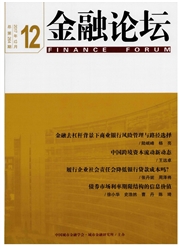

 中文摘要:
中文摘要:
现金持有水平影响公司信用评级的高低,进而影响公司债券融资成本,发债公司存在基于评级动机的现金持有行为。以2007~2013年间发行公司债券的上市公司为样本,运用OPRO—BIT及OLS模型验证超额现金持有量、信用评级与债券融资成本间的关系。研究发现,控制公司正常现金持有量后,公司的正向超额现金持有量与首次信用评级成正比,评级机构受到公司现金持有策略的影响;细化到市场反应层面,债券融资成本与信用评级显著负相关,公司的现金持有策略调整通过信用评级的中介作用,显著节约了融资成本;考虑其与信用评级的交互作用,市场参与者在识别了公司超额现金持有行为后,则要求提高债券收益率以补偿违约风险的增加。
 英文摘要:
英文摘要:
Cash holdings level will affect credit ratings, and significantly affect the financing costs of corporate bonds. Therefore the companies have excess cash holdings motivation for credit ratings purpose. Selecting the A - share listed companies which issued corporate bonds during 2007 -2013 as research sample, this paper used multi -valued response and OLS regression model to verify the relationships among capital structure adjustments, credit ratings and financing costs of corporate bonds. From the empirical results, we found after controlling the normal cash holdings, the excess cash holdings was also proportionally positive to the issuing companies' initial credit rat- ing. These results suggested that rating agencies' decisions were vulnerable to the behavior of targeted financial in- dicators adjustment by issuing companies. Then, we tested the market reaction, and found a significant negative correlation between corporate bond financing costs and credit ratings. Considering the interaction with the Cash Holdings policy and the credit rating, and after identifying the company' s excess cash holdings, market participants will require higher bond yields to compensate for the increased risk of default, and the interaction will weaken the influence of the appropriate rating on the company' s debt financing costs.
 同期刊论文项目
同期刊论文项目
 同项目期刊论文
同项目期刊论文
 期刊信息
期刊信息
